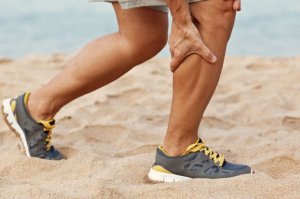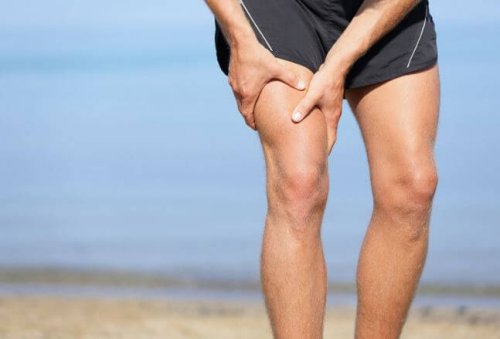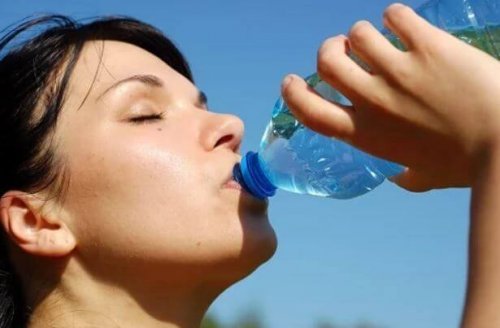How Your Diet Can Help Prevent Muscle Cramps

Anyone can experience muscle cramps, even if you’re not an athlete; many of us are likely to have woken up in the middle of the night because of a cramp. A healthy balanced diet can help us to avoid these painful muscle contractions.
Why do cramps happen?
There are several causes of these muscle spasms; heat is one of them. High temperatures during exercise cause dehydration and hence, the loss of electrolytes through our sweat.
Not warming up correctly before a workout and not stretching out your muscles afterwards, may also cause muscle cramps. Equally, overtraining can also result in painful episodes.

A healthy diet helps to prevent muscle cramps
You’ve probably heard that athletes should eat bananas because this fruit has large amounts of potassium; this is actually pretty accurate. By eating a healthy diet, it is possible to prevent muscle cramps from happening.
A lack of vitamins and minerals in our body is generally the most frequent cause of cramps. Therefore, by making sure that the correct nutrients are in the food we eat, we can prevent cramping pains.
The main minerals that are directly related to muscle function are potassium, calcium, magnesium and sodium. Without them it’s not possible for the nervous system and the muscles to communicate properly.
Calcium and potassium food sources
Dairy, fresh cheeses, yogurt and nuts are good calcium and potassium sources. Fish, such as salmon and sardines, and vegetables such as, cabbage, kale, cauliflower, broccoli, potatoes and tomatoes, work just as well.
Legumes, grains and egg yolks may also provide some of the calcium that we need. Potassium can be found not only in bananas, but also in whole grain cereals and fruits such as, oranges, kiwi, cantaloupe and avocado, among others.
The importance of salt
We’ve heard from many experts that we must reduce our salt intake. In some cases, athletes must make sure they increase their salt intake to ensure they’re getting enough salt. The intensity of their physical activity makes them lose great quantities of sodium which affects their muscular system.
In order to maintain the recommended sodium requirements for the body, we can usually take the salt that we need from the foods that we consume. Dehydration can be common in athletes during exertion and it may drastically decrease their sodium levels and cause muscle cramps.
Salt, meat, fish and canned foods are great sources of sodium, an essential element to ideal muscle functioning. Plus, they can easily find a place in your diet.
Where can you find magnesium?
Magnesium is very important for the muscular system, besides having other benefits for the body. A decrease in the levels of this element may cause painful cramps. To avoid them, it’s necessary to include in your diet foods that are rich in this mineral.
We may find magnesium in green leaf vegetables such as, spinach and kale. Sardines, salmon and tuna, as well as seafood in general, have high levels. Lentils, pumpkin seeds, peanut butter and dark chocolate are also high in potassium and therefore ideal to help prevent cramps.
The importance of hydration

Just like the intake of certain foods will help to prevent muscle cramps, staying hydrated is also fundamental. If your body doesn’t have enough fluids, the nutrients and minerals won’t get to the muscles, causing you to have painful cramps.
Maintaining a hydration habit, whether you’re an athlete or not, is very important to the general functioning of the body. Beyond water, we can also stay hydrated by consuming fruits, gelatin desserts, vegetables, soup and tea, among others.
Prevention is key
A healthy diet that includes foods rich in essential minerals will help you to avoid painful muscle spasms. You must plan your meals in advance and make sure that they’re high in calcium, magnesium, sodium and potassium to keep you from any unpleasant cramping episodes.
Isotonic drinks can also help. They recover the electrolytes that you have lost and as a result, will prevent muscle cramps.
Anyone can experience muscle cramps, even if you’re not an athlete; many of us are likely to have woken up in the middle of the night because of a cramp. A healthy balanced diet can help us to avoid these painful muscle contractions.
Why do cramps happen?
There are several causes of these muscle spasms; heat is one of them. High temperatures during exercise cause dehydration and hence, the loss of electrolytes through our sweat.
Not warming up correctly before a workout and not stretching out your muscles afterwards, may also cause muscle cramps. Equally, overtraining can also result in painful episodes.

A healthy diet helps to prevent muscle cramps
You’ve probably heard that athletes should eat bananas because this fruit has large amounts of potassium; this is actually pretty accurate. By eating a healthy diet, it is possible to prevent muscle cramps from happening.
A lack of vitamins and minerals in our body is generally the most frequent cause of cramps. Therefore, by making sure that the correct nutrients are in the food we eat, we can prevent cramping pains.
The main minerals that are directly related to muscle function are potassium, calcium, magnesium and sodium. Without them it’s not possible for the nervous system and the muscles to communicate properly.
Calcium and potassium food sources
Dairy, fresh cheeses, yogurt and nuts are good calcium and potassium sources. Fish, such as salmon and sardines, and vegetables such as, cabbage, kale, cauliflower, broccoli, potatoes and tomatoes, work just as well.
Legumes, grains and egg yolks may also provide some of the calcium that we need. Potassium can be found not only in bananas, but also in whole grain cereals and fruits such as, oranges, kiwi, cantaloupe and avocado, among others.
The importance of salt
We’ve heard from many experts that we must reduce our salt intake. In some cases, athletes must make sure they increase their salt intake to ensure they’re getting enough salt. The intensity of their physical activity makes them lose great quantities of sodium which affects their muscular system.
In order to maintain the recommended sodium requirements for the body, we can usually take the salt that we need from the foods that we consume. Dehydration can be common in athletes during exertion and it may drastically decrease their sodium levels and cause muscle cramps.
Salt, meat, fish and canned foods are great sources of sodium, an essential element to ideal muscle functioning. Plus, they can easily find a place in your diet.
Where can you find magnesium?
Magnesium is very important for the muscular system, besides having other benefits for the body. A decrease in the levels of this element may cause painful cramps. To avoid them, it’s necessary to include in your diet foods that are rich in this mineral.
We may find magnesium in green leaf vegetables such as, spinach and kale. Sardines, salmon and tuna, as well as seafood in general, have high levels. Lentils, pumpkin seeds, peanut butter and dark chocolate are also high in potassium and therefore ideal to help prevent cramps.
The importance of hydration

Just like the intake of certain foods will help to prevent muscle cramps, staying hydrated is also fundamental. If your body doesn’t have enough fluids, the nutrients and minerals won’t get to the muscles, causing you to have painful cramps.
Maintaining a hydration habit, whether you’re an athlete or not, is very important to the general functioning of the body. Beyond water, we can also stay hydrated by consuming fruits, gelatin desserts, vegetables, soup and tea, among others.
Prevention is key
A healthy diet that includes foods rich in essential minerals will help you to avoid painful muscle spasms. You must plan your meals in advance and make sure that they’re high in calcium, magnesium, sodium and potassium to keep you from any unpleasant cramping episodes.
Isotonic drinks can also help. They recover the electrolytes that you have lost and as a result, will prevent muscle cramps.
This text is provided for informational purposes only and does not replace consultation with a professional. If in doubt, consult your specialist.








